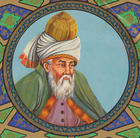
Jalāl ad-Dīn Muhammad Rūmī (Persian: جلالالدین محمد رومی), also known as Jalāl ad-Dīn Muhammad Balkhī (جلالالدین محمد بلخى), Mawlānā/Mevlânâ (مولانا, "our master"), Mevlevî/Mawlawī (مولوی, "my master"), and more popularly simply as Rumi (1207 – 17 December 1273), was a 13th-century Persian[1][8] poet, jurist, Islamic scholar, theologian, and Sufi mystic.[9] Rumi's influence transcends national borders and ethnic divisions: Iranians, Tajiks, Turks, Greeks, Pashtuns, other Central Asian Muslims, and the Muslims of South Asia have greatly appreciated his spiritual legacy for the past seven centuries.[10] His poems have been widely translated into many of the world's languages and transposed into various formats. Rumi has been described as the "most popular poet"[11] and the "best selling poet" in the United States.[12][13]
Rumi's works are written mostly in Persian, but occasionally he also used Turkish, Arabic, and Greek,[14][15][16] in his verse.[17][18] His Mathnawī, composed in Konya, is considered one of the greatest poems of the Persian language.[19][20] His works are widely read today in their original language across Greater Iran and the Persian-speaking world.[21][22] Translations of his works are very popular, most notably in Turkey, Azerbaijan, the United States, and South Asia.[23] His poetry has influenced Persian literature, but also Turkish, Ottoman Turkish, Azerbaijani, Punjabi, Hindi, and Urdu, as well as the literature of some other Turkic, Iranian, and Indo-Aryan languages including Chagatai, Pashto, and Bengali






